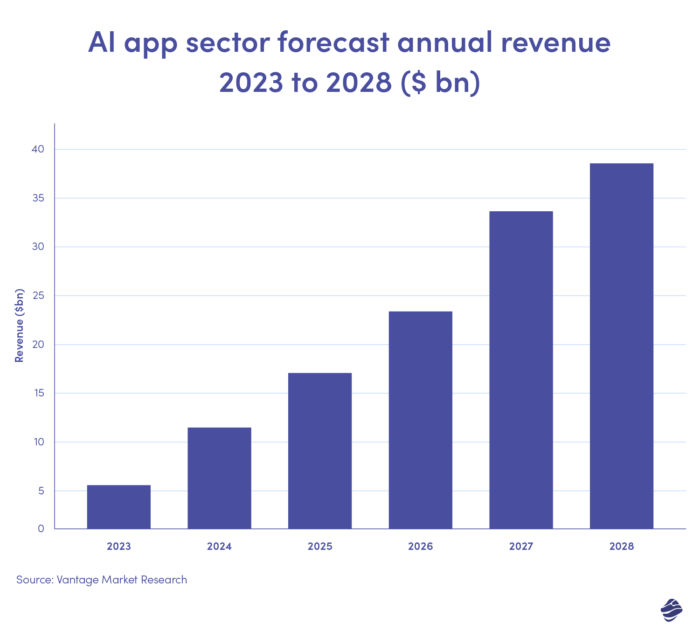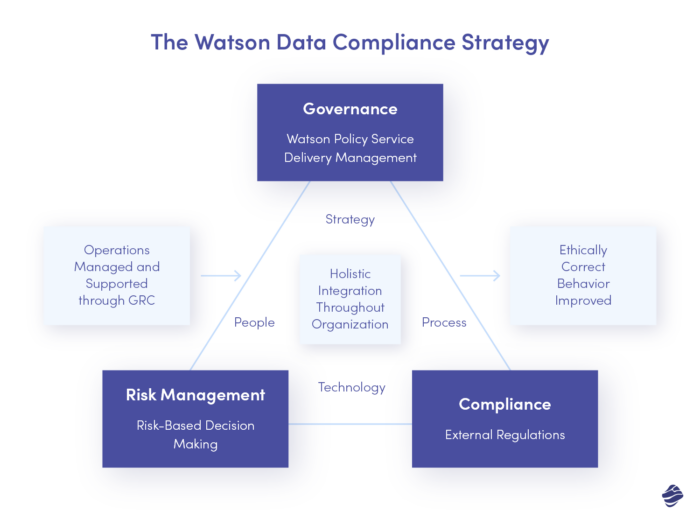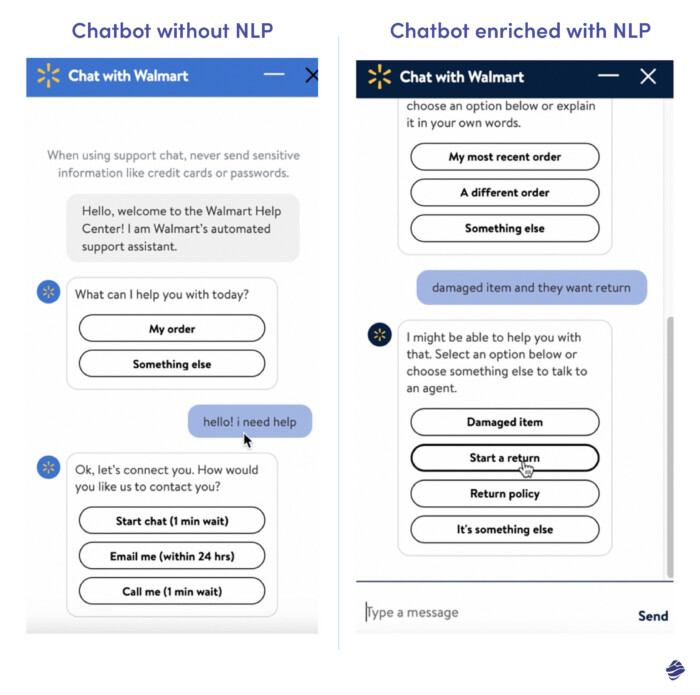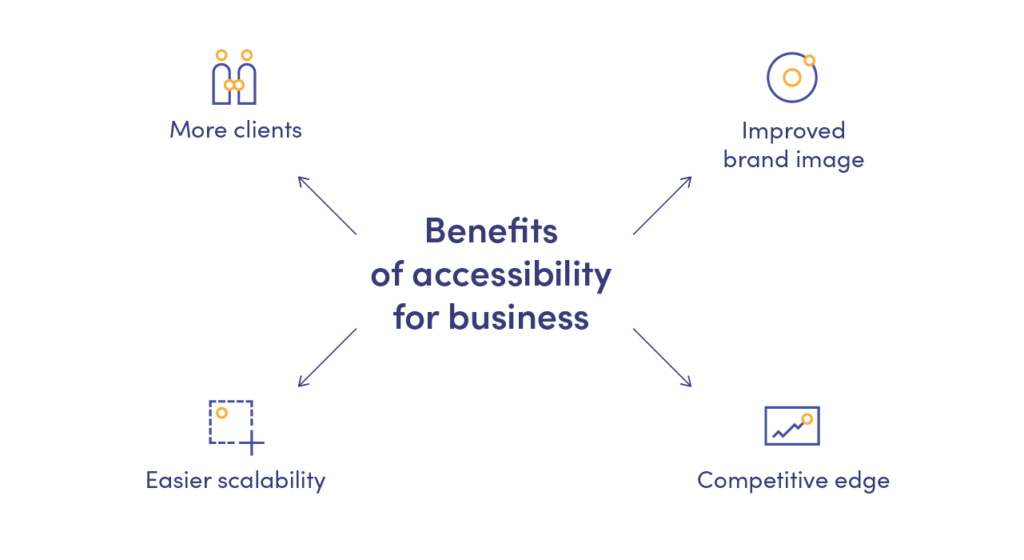Here’s a thought to ponder: 97% of mobile users are already engaging with voice assistants powered by AI. By the end of 2023, there were a staggering 145.1 million voice assistant users.
Even more impressive? The AI app sector, which generated a whopping $2.5 billion in revenue in 2022, is poised for explosive growth with a compound annual growth rate of 38.3% through 2028. These figures aren’t just numbers; they’re indicators of a paradigm shift in how we interact with technology. Welcome to a world where AI is not just a feature but a fundamental component of mobile app experiences.

Here’s what we’ll dive into:
- The latest AI trends in mobile app development.
- AI’s role in enhancing user experience.
- Boosting mobile app security with AI.
- Varied applications of AI in app development.
- Case studies of AI-driven success in mobile apps.
- Overcoming challenges in AI integration.
- Predictions for AI’s future in the mobile app industry.
P.S., at Miquido, we’re not just following these trends; we’re at the forefront. Our team of over 200 dedicated professionals is turning these statistics into tangible experiences, one app at a time. Hire us for generative AI development services as we unveil the transformative power of AI in mobile apps.
7 Emerging AI Trends in Mobile App Development
This year is witnessing a surge in innovative AI trends within mobile app development. These trends are reshaping the industry, redefining how users interact with their mobile devices. From personalized experiences to intelligent automation, AI is the driving force behind these exciting developments.
Let’s unpack these trends to see how they set the stage for a smarter, more intuitive mobile future.
1. Personalized User Experiences Through AI
Personalized user experiences are at the forefront of AI-driven mobile app development. Sure, they’re making apps more user-friendly; but it’s also about crafting experiences that resonate on a personal level. AI algorithms play a pivotal role here, meticulously analyzing user behavior, preferences, and interactions. But how does this translate into real-world applications?
Picture this: You open a shopping app, and it instantly displays products aligned with your style and previous purchases. That’s AI in action. A study from Salesforce shows that 76% of consumers expect companies to understand their needs and expectations. AI personalization caters to this expectation by delivering content and functionalities tailored to individual preferences, making each interaction feel like a personalized journey.
- Data is Key: Start by gathering comprehensive user data. The more data you have, the more accurate your AI’s predictions and personalizations will be.
- AI Tools to Consider: Utilize AI tools like TensorFlow or IBM Watson to analyze user data and implement personalization. These tools offer robust AI capabilities to enhance user experience.
- Testing and Feedback: Continuously test and get user feedback. Remember, personalization needs to evolve with the user’s changing preferences.
Take Spotify’s ‘Discover Weekly’ as a case in point. This feature uses AI to analyze your listening habits and then suggests a playlist every week that feels personally curated. It’s a brilliant example of AI-driven personalization done right.

Takeaways
- Integrate AI-driven personalization into your app to stay ahead in the mobile app market.
- Regularly update your personalization algorithms based on user feedback and behavior changes.
- Use AI not just to meet but to exceed user expectations, creating a memorable and unique app experience.
Personalization through AI is the future of mobile app development. It’s a powerful way to connect with users on a deeper level, ensuring your app isn’t just downloaded but genuinely loved and regularly used.
2. Intelligent Automation is The Next Frontier in Mobile Apps
Another major trend reshaping mobile app development is intelligent automation, powered by AI. This trend goes beyond efficiency; it’s about transforming user interactions and backend operations into a seamless, intuitive process.
The Power of Intelligent Automation in Apps
Imagine a scenario where your app not only responds to user commands but also anticipates needs and automates tasks without any prompt. For instance, a fitness app that tracks your workouts but also suggests personalized exercise plans based on your progress, weather conditions, and even your calendar schedule. This level of automation is achieved through sophisticated AI algorithms that learn and adapt to user behaviors and preferences.
- Embrace Efficiency: A recent report indicates that users of apps with AI chatbot automation have positive satisfaction rates of 80%. This is because users appreciate an experience that simplifies their lives.
- Tools for Developers: Leveraging tools like Google’s ML Kit or Microsoft Azure’s Cognitive Services can help developers easily integrate intelligent automation into their apps.
- Feedback Loop: Establish a feedback loop to continually refine the automated processes based on user interactions and preferences.
Key Insights
- Integrate AI for task automation in your app to enhance user experience and engagement.
- Regularly update your AI models to adapt to changing user patterns and preferences.
- Aim for a balance between automation and user control to ensure a comfortable and personalized experience.
Intelligent automation in mobile apps represent a significant shift towards more intuitive, user-centric app experiences. Moving forward, winning developers will focus on creating apps that serve a purpose and proactively enhance users’ daily lives.

3. AI-Enhanced Security to Reinvent Mobile App Safety
In an era where digital threats are evolving rapidly, AI-enhanced security isn’t just a feature – it’s a necessity. AI’s role in enhancing security goes beyond traditional methods, centering proactive threat detection and real-time response.
For instance, AI can analyze user behavior to detect anomalies that may signify a security breach, such as unusual login attempts or suspicious transactions. As a result, you’re both protecting data and preserving the user’s confidence in your application.
- A Security Imperative: Mortgage technology company Ellie Mae shows that AI-driven security solutions can identify threats 10x faster than traditional methods.
- Tools for Enhanced Security: Tools like IBM’s Watson for Cyber Security can provide advanced threat intelligence.
- User Education: Incorporate AI features in mobile apps that educate users about security practices, making them active participants in safeguarding their data.

Key Insights
- Implement AI-based security features in your app to provide robust protection against cyber threats.
- Continuously update your AI security protocols to keep up with the evolving digital threat landscape.
- Strike a balance between stringent security measures and user convenience to ensure a seamless user experience.
AI-enhanced security in mobile apps is more than a trend; it’s a critical evolution. As threats become more sophisticated, AI provides a dynamic shield, continuously learning and adapting to new challenges. It’s about creating a secure environment where users can confidently and confidently engage with your app.
4. AI-Driven Predictive Analytics to Shape Future Interactions
This AI capability combines analyzing the past with foreseeing the future to enhance user experience and decision-making. Predictive analytics uses AI to analyze large data sets, identify patterns, and predict future user behaviors and trends.
For instance, a shopping app can predict future buying trends based on past purchasing behavior, enabling personalized product recommendations. This anticipatory approach means users receive content and recommendations that resonate with their future needs, not just their past actions.
- Impact on Engagement: According to Netflix’s former vice president of innovation, 80% of subscribers stay engaged thanks to the predictive recommendation engine.
- Recommended Tools: Tools like Google Analytics and Adobe Analytics offer advanced predictive analytics features that can be integrated into mobile apps.
- Continual Learning: Ensure your AI algorithms are continually learning and adapting to new data to refine predictions and recommendations.
Key Insights
- Leverage predictive analytics in your app to offer personalized experiences and make informed business decisions.
- Regularly analyze and update your data sets to ensure your predictive models stay accurate and relevant.
- Use predictive insights to stay ahead of user needs, delivering a proactive rather than reactive user experience.
AI-driven predictive analytics in mobile apps mark a shift from reactive to proactive engagement. Leveraging the power of AI to not just meet but anticipate user needs, sets the stage for more intelligent, anticipatory, and personalized app experiences.
5. AI-Powered Conversational Interfaces to Revolutionize Interaction
Conversational AI, through chatbots and voice assistants, is transforming user interaction from a series of taps and swipes to natural, human-like conversations. It’s an entirely new way for users to interact with apps.
Imagine a fitness app where you can simply talk to set your workout goals and preferences, or a customer service app that understands and responds to your queries instantly and accurately. This level of interaction is enabled by advanced natural language processing (NLP) and machine learning services and algorithms, making the user experience more intuitive and engaging.

- Rising Popularity: Studies indicate that conversational AI can increase customer satisfaction rates by up to 40%.
- Tools for Development: Utilize platforms like Dialogflow or Amazon Lex to integrate sophisticated conversational AI into your apps.
- User-Centric Design: Design your conversational interfaces to be as user-friendly and natural as possible, focusing on a seamless user experience.
Key Insights
- Integrate conversational AI into your app to offer a more natural, interactive user experience.
- Continuously improve and update your conversational AI based on user feedback and interaction data.
- Focus on making the AI conversations as natural and human-like as possible to increase user engagement and satisfaction.
Conversational AI is a paradigm shift in how users interact with mobile apps. Built correctly, it creates a more personal, engaging, and efficient way for users to get the most out of their app experiences.
6. AI in Enhancing Mobile App Accessibility
A pivotal trend for AI is its role in enhancing mobile apps accessibility. This trend is all about extending the functionality of your apps to be universally usable, catering to the diverse needs of all users, including those with disabilities.
Breaking Barriers with AI-Driven Accessibility
AI-driven accessibility features in mobile apps are transforming the user experience for people with disabilities. Picture a reading app that uses AI to convert text to speech for visually impaired users, or a social media app that provides real-time captioning for the hearing impaired. These features promote inclusivity; but at a big-picture level, they empower all users to engage fully with the digital world.
This level of accessibility is achieved through AI technologies like image and voice recognition, and natural language processing, ensuring that apps are more than just accessible—they’re intuitively usable for everyone.
- Inclusivity as a Standard: Recent data shows that apps with advanced accessibility features see an increase in user satisfaction scores across all user groups.
- Essential Tools: Employ AI technologies like Google’s Cloud Vision API or Apple’s VoiceOver to create accessible app features.
- User Feedback is Crucial: Regularly gather feedback from users with diverse accessibility needs to continually refine and improve these features.
Key Insights
- Implement AI-enhanced accessibility features in your app to cater to a broader audience.
- Keep updating and testing these features to ensure they meet the varying needs of users with disabilities.
- Use AI not just to comply with accessibility standards but to exceed them, offering an unparalleled user experience.

AI’s role in enhancing mobile app accessibility signifies a move towards more empathetic and inclusive technology. It’s about leveraging AI to create apps that don’t just reach a wide audience but truly connect with every user, regardless of their abilities.
7. AI-Driven Contextual and Behavioral Analysis
AI-driven contextual and behavioral analysis involves understanding and responding to the user’s current situation and behavior patterns. For instance, a travel app might suggest destinations and activities based on the user’s current location, time of day, and previous travel preferences.
Similarly, a health app could adjust its advice and notifications based on the user’s current activity level or health data. This level of contextual understanding is achieved through advanced AI algorithms that analyze a variety of data points to offer highly personalized and situationally appropriate interactions.
- Recommended Tools: Implement AI technologies like machine learning frameworks and context-aware computing to enhance your app’s ability to analyze and respond to user behavior.
- Balancing Personalization and Privacy: Always maintain a balance between personalized experiences and user privacy. Transparently communicate how data is used to build trust.
Key Insights
- Leverage AI for contextual and behavioral analysis to offer hyper-personalized user experiences.
- Ensure your app’s AI algorithms are continuously updated to adapt to evolving user behaviors.
- Prioritize user consent and data privacy when collecting and analyzing behavioral and contextual data.
The integration of AI for contextual and behavioral analysis in mobile apps signifies a move towards more empathetic and intelligent user experiences. AI helps us deeply understand and appropriately respond to the user’s current context and behavior, providing a more relevant, engaging, and helpful app experience.
Transformative Impact of AI in Mobile Apps on User Experience
As we delve deeper into the role of AI in mobile apps, it’s clear that its impact on enhancing user experience (UX) is profound. AI is revolutionizing how users interact with apps, making experiences more personalized, intuitive, and engaging.
Personalization at Its Peak
In the realm of mobile apps, AI’s role in personalization is nothing short of revolutionary. By intricately analyzing user data, AI is not just tailoring experiences; it’s crafting journeys that feel uniquely personal for each user.
This advanced personalization isn’t a luxury anymore; it’s what users expect. A study by Epsilon found that 80% of consumers are more likely to make a purchase from a brand that provides personalized experiences.
Deep Diving into AI-Personalization
- Content Curation Mastery: In media apps, AI analyzes your viewing or reading history to suggest content that aligns with your interests. For example, Netflix’s recommendation system is AI-driven, providing viewers with movie and show suggestions that feel tailor-made.
- Shopping Tailored to You: E-commerce apps are using AI to revolutionize shopping experiences. By tracking browsing and purchase history, AI provides personalized product recommendations, akin to a personal shopper in your pocket. Amazon’s personalized recommendations are a prime example, often leading to increased user engagement and sales.
Pro Tips for Maximizing AI-Personalization
- Data Is Gold: Collect and analyze user data effectively. The more precise the data, the more personalized the experience.
- Tools to Consider: Utilize AI tools like Adobe Sensei or IBM Watson to enhance personalization capabilities in your app.
- Continuous Evolution: Regularly update your AI algorithms to adapt to changing user preferences and behaviors.
Smoother, More Intuitive Interactions
AI-driven conversational interfaces, such as chatbots and voice assistants, have transformed how users interact with mobile apps. More than just add-ons, they’re revolutionizing the core of user interaction.
With the ability to understand and process natural language, AI is enabling a communication style that’s remarkably human-like. Gartner predicts that by 2025, customer service organizations that embed AI in their customer engagement center platforms will elevate operational efficiency by 25%.
The Evolution of Conversational AI
- Beyond Basic Commands: AI interfaces in apps are no longer just simple commands or queries. They’re capable of engaging in meaningful conversations, understanding context, and even detecting user emotions to some extent. For instance, Google Assistant’s ability to understand and respond to conversational language has made it a staple in many users’ daily lives.
- Enhancing Efficiency and Enjoyment: These AI interfaces streamline complex tasks. A banking app with a voice assistant can help users complete transactions or get financial advice just through conversational input. This not only saves time but also adds an element of ease and enjoyment to tasks that were once mundane.
Key Strategies for Implementing Conversational AI
- Focus on Natural Language Processing (NLP): Invest in robust NLP capabilities to make interactions as natural as possible.
- Recommended Tools: Tools like Amazon Lex or Google Dialogflow are great for building sophisticated conversational interfaces.
- User-Centric Design: Always design keeping the end-user in mind. The goal is to make conversations intuitive and helpful, not just technologically impressive.
Enhanced Accessibility
AI’s role in enhancing app accessibility is a game-changer, particularly for users with disabilities. Features like voice-to-text and real-time captioning are not just innovative; they’re essential for inclusivity. The World Health Organization reports that 2.5 billion people need one or more assistive products, with many benefiting from digital advancements like these.
Breaking Down Digital Barriers
- Voice-to-Text for the Visually Impaired: This feature enables visually impaired users to interact with apps using voice commands, making navigation easier and more independent.
- Real-Time Captioning for the Hearing Impaired: Apps with real-time captioning allow users who are deaf or hard of hearing to access content that would otherwise be inaccessible, ensuring no one is left behind in the digital space.
Tools and Tips for Enhanced Accessibility
- Utilize AI Accessibility Tools: Implement tools like Google’s Live Transcribe for real-time captioning or Apple’s VoiceOver for voice-to-text features.
- User-Centric Design: Design with accessibility in mind from the outset. Regular testing with users who have disabilities can provide invaluable insights.
Predictive Analytics for Anticipatory Experience
AI-driven predictive analytics is transforming mobile app UX by enabling a proactive approach. Apps can now anticipate user needs and provide suggestions or actions in advance. According to Salesforce, 51% of consumers expect that companies will anticipate their needs and make relevant suggestions before contact.
Anticipating User Needs
- E-Commerce and Retail Apps: By analyzing past shopping behavior, these apps can predict future buying trends, offering personalized product recommendations.
- Health and Fitness Apps: These apps can suggest workout routines and dietary plans based on the user’s historical health data and preferences.
Strategies for Effective Predictive Analytics
- Leverage Advanced AI Tools: Use AI tools for deep learning and data analytics to accurately predict user needs.
- Continual Data Analysis: Regularly update your predictive models with fresh data to ensure relevancy and accuracy.
Real-Time Assistance and Support
AI is revolutionizing real-time assistance and support in mobile apps, making the user experience smoother and more efficient. This instant support is crucial in areas like customer service, where IBM reports that AI can reduce response times by up to 99%.
AI-Driven Support in Action
- Customer Service Apps: AI chatbots can provide immediate responses to queries, significantly reducing wait times and enhancing user satisfaction.
- Productivity Apps: These apps use AI to assist users in completing tasks or managing schedules more effectively and efficiently.
Implementing AI for Real-Time Support
- Invest in AI Chatbot Technology: Implement AI chatbots for instant, efficient user support.
- Focus on User Experience: Ensure that AI-driven support is intuitive and adds real value to the user’s experience.
Critical Role of AI in Mobile Apps’ Security and Data Protection
AI’s role in enhancing mobile app security and protecting user data has become more crucial than ever. With the digital landscape evolving rapidly, security threats have become sophisticated, making AI not just a luxury but a necessity for safeguarding user data.
Elevating Security with Advanced AI
AI is transforming mobile app security by introducing advanced, proactive measures. It’s capable of identifying potential threats and vulnerabilities before they become actual problems.
For instance, AI algorithms can detect unusual patterns that might indicate a security breach, such as irregular login attempts or unexpected changes in user behavior.
AI-Driven Security in Numbers
A report by Norton indicates that cybercrime cost consumers more than $20 billion in 2020. In this context, AI’s role in cybersecurity becomes even more pivotal.
It’s estimated that AI-driven security solutions can identify and counteract cyber threats up to 45% more efficiently than traditional security software.
Tools and Strategies for AI-Enhanced Security
- Implement AI-Based Threat Detection: Use AI tools to continuously monitor and analyze data for potential threats, ensuring swift and efficient threat detection.
- Tools to Consider: Leverage AI-based security platforms like Darktrace, which use machine learning to detect and respond to cyber threats in real-time.
- Regular Updates and Training: Keep your AI models updated to recognize the latest cyber threats and train your staff to recognize and respond to security alerts effectively.
In financial apps, where security is paramount, AI enhances authentication processes. Features like biometric authentication, which includes fingerprint scanning and facial recognition, are powered by AI to ensure that access to sensitive financial information is securely guarded.
User Data Protection Is A Top Priority
AI also plays a vital role in protecting user data. By analyzing data access patterns and user behavior, AI can detect and prevent unauthorized data breaches, thus maintaining user trust and app integrity.
AI’s role in enhancing mobile app security and protecting user data is indispensable. It provides a dynamic, intelligent defense mechanism against the ever-evolving threats in the digital world, ensuring that user data is stored and securely protected.
Other Diverse Applications of AI in Mobile App Development
As we continue to navigate, the applications of AI in mobile app development are proving to be as diverse as they are innovative. AI’s versatility is both transforming user experiences and security, and opening new doors in various aspects of mobile app development.
Beyond the User Interface: AI’s Varied Roles
- Enhanced Analytics and Business Insights: AI-driven analytics tools are providing app developers and businesses with deeper insights into user behavior and app performance, facilitating more informed decision-making.
- Optimizing App Performance: AI algorithms are being used to optimize app performance, including load balancing, memory management, and battery usage, ensuring a smooth and efficient user experience.
AI in Content Creation and Management
One of the more creative applications of AI is in the realm of content creation and management within mobile applications. AI can generate and curate content based on user preferences, creating a dynamic and personalized content experience.
AI for Development and Testing
- Automated Testing and Debugging: AI is revolutionizing the development process through automated testing and debugging, significantly reducing the time and resources required for these tasks.
- Predictive Maintenance: AI tools can predict potential issues and maintenance needs, helping developers proactively address problems before they affect users.
The diverse applications of AI in mobile app development underscore its transformative power across various domains. From improving app functionality to enhancing content relevance and user engagement, AI is becoming the backbone of innovative app development.
Success Stories of AI Integrations in Mobile Apps Across Different Sectors
AI has been a game-changer across various sectors. AI-enabled apps have led to numerous success stories, demonstrating how radically AI can revolutionize different industries.
Let’s dive into some real-world generative AI use cases where AI has significantly enhanced mobile app experiences across diverse fields.
Healthcare: AI for Better Patient Outcomes
In the healthcare sector, AI has made groundbreaking strides. Consider an app like Babylon Health, which uses AI for initial medical consultations.
By analyzing symptoms reported by users, the AI provides potential diagnoses and advice, significantly reducing the strain on medical professionals and providing timely assistance to patients.
E-Commerce: Personalized Shopping Experiences
In e-commerce, AI has transformed how we shop. Amazon’s mobile app is a prime example, using AI to offer personalized product recommendations based on browsing and purchase history. This not only enhances the shopping experience but also increases sales conversions.
Education: Customized Learning Paths
AI-integrated apps like Duolingo offer a personalized learning experience. The AI tailors lessons based on the user’s learning speed and style, making education more effective and engaging.
Finance: Smarter Money Management
In finance, apps like Mint use AI to provide users with personalized financial advice. By analyzing spending habits and financial goals, the AI offers tailored suggestions for budgeting and saving, helping users manage their finances more effectively.
Travel: Enhanced Exploration
In the travel industry, apps like Hopper utilize AI to predict flight and hotel prices, allowing users to book at the most opportune time and save money. This predictive capability has revolutionized how users plan and book their travels.
Entertainment: Curated Content
When it comes to AI in entertainment, streaming apps like Netflix and Spotify use AI to curate content based on user preferences. This personalization keeps users engaged and makes content discovery an effortless and enjoyable experience.
These real-world examples illustrate how AI integration in mobile apps isn’t just trendy technological advancement but provides tangible benefits to users and businesses alike.
Across sectors, AI is enhancing user experiences, streamlining processes, and opening up new possibilities for innovation and efficiency. The success of these integrations demonstrates AI’s potential to continue shaping various industries in the years to come.
Challenges and Strategic Considerations in AI Integration
Integrating AI into mobile apps can be transformative, but it’s not without its challenges. Strategic planning and a deep understanding of potential obstacles are key to successful AI integration.
Let’s explore the primary challenges and strategic considerations that developers and businesses face:
Balancing AI Complexity with User Simplicity
- Challenge: Implementing complex AI algorithms while ensuring the app remains user-friendly.
- Strategy: Focus on a seamless user interface that masks the AI complexities. User testing is crucial to ensure the app remains intuitive. Miquido specializes in creating user-friendly interfaces that seamlessly integrate complex AI functionalities, ensuring your app remains intuitive and accessible.
Managing Resource Constraints
- Challenge: AI functionalities can be resource-intensive, affecting app performance and battery life.
- Strategy: Optimize AI algorithms for efficiency. Consider cloud-based AI solutions to reduce the load on the user’s device. Miquido’s expertise in optimizing AI algorithms for efficiency and using cloud-based AI solutions can significantly reduce the load on users’ devices while maintaining high performance.
Ensuring Data Privacy and Security
- Challenge: Handling sensitive user data responsibly while leveraging AI capabilities.
- Strategy: Implement robust data encryption and privacy policies. Transparency with users about data usage is critical. You’ll need to implement robust data encryption and privacy policies, ensuring your app complies with all data privacy regulations and maintains user trust. (Luckily, Miquido can help with this too).
Addressing AI Bias and Ethical Concerns
- Challenge: AI algorithms can inherit biases based on the data they are trained on.
- Strategy: Use diverse data sets for training AI. Regularly audit and update AI models to minimize bias. Aggregating data from several sources and consulting with industry experts like the ones on the team at Miquido can help ease the process.
Keeping Up with Rapid Technological Changes
- Challenge: The AI landscape is continuously evolving, making it challenging to stay current.
- Strategy: Invest in ongoing research and development. Stay agile to integrate new AI advancements, establishing AIops (operations) to keep your pipeline up-to-date.
Scaling AI Solutions
- Challenge: As the user base grows, scaling AI solutions can be challenging.
- Strategy: Design AI systems with scalability in mind. Utilize cloud infrastructure to handle increased loads. Miquido designs AI systems with scalability in mind, using cloud infrastructure and other advanced technologies to handle increased loads efficiently.
Ensuring Accurate and Relevant AI Outputs
- Challenge: AI is only as good as the data it analyzes and the algorithms it uses.
- Strategy: Regularly update the AI system with new data and refine algorithms for accuracy. Ensure the accuracy and relevance of your AI outputs by regularly updating the AI system with new data and refining algorithms.
Successfully integrating AI into mobile apps requires a careful balance of technological expertise, like the kind provided by Miquido, and a deep understanding of user needs and expectations. By addressing these challenges with thoughtful strategies, developers can harness the power of AI to create innovative, efficient, and engaging AI-powered apps.
Future Predictions for AI in the Mobile App Industry
The future of AI in the mobile app development industry is poised for even more groundbreaking advancements. The rapid pace of technological innovation and the ever-increasing importance of AI apps in our daily lives suggest that AI will continue to play a pivotal role. Here are some predictions for what the future holds:
- Seamless AI Integration Becomes the Norm: AI integration in mobile apps will become more seamless and ubiquitous, moving beyond standalone features to become a fundamental part of app infrastructure.
- Advancements in AI Personalization: AI will offer even more advanced levels of personalization, predicting user needs and behaviors with greater accuracy and providing highly customized experiences.
- AI and AR/VR Integration: The integration of AI with AR (Augmented Reality) and VR (Virtual Reality) will create more immersive and interactive app experiences, particularly in gaming, education, and retail.
- AI-Driven Proactive Health Monitoring: In the healthcare sector, AI will advance to provide more proactive health monitoring and personalized healthcare recommendations, using real-time data from wearable devices.
- AI in Sustainable Development: AI will play a significant role in promoting sustainable practices through mobile apps, from optimizing resource use to promoting eco-friendly habits.
- Enhanced AI Security Measures: As AI becomes more prevalent, so will the need for advanced security measures. AI will evolve to offer even more sophisticated methods of protecting user data and privacy.
The future of AI in the mobile app industry is one of limitless potential. With an artificial intelligence app development company like Miquido leading the charge, we can expect to see AI continue to transform how we interact with our mobile devices, making our experiences more personalized, immersive, and secure. The integration of artificial intelligence in mobile apps will not just be a trend but a standard, driving innovation and shaping the future of the mobile app industry.
Empower Your Mobile App’s Future with Miquido’s AI Expertise
As we close the chapter on this exploration of AI in mobile app development, it’s clear that the future isn’t about AI taking over; it’s about how AI technology makes our lives better. You’ve journeyed through cutting-edge trends, real-world applications, and the exciting possibilities that artificial intelligence technology brings to the mobile app world.
Let’s recap the key takeaways:
- AI’s role in personalization and user experience is transformative.
- Enhanced security and accessibility through AI are non-negotiables.
- The integration of AI in various sectors showcases its versatility.
- Future trends predict more seamless, intuitive, and advanced AI integrations.
Now, imagine harnessing all this potential in your next AI-powered mobile app project. That’s where Miquido steps in. In the dynamic landscape of AI-powered mobile apps, staying ahead means embracing change and innovation. Miquido stands as your ideal AI app development company in this journey, blending AI expertise with a deep understanding of user-centric design.
Whether it’s creating personalized experiences, ensuring top-notch security, or venturing into new realms like AR/VR, Miquido’s team is ready to bring your vision to life. With Miquido, the future of AI in mobile apps is not just a distant dream; it’s a reality waiting to be created.









